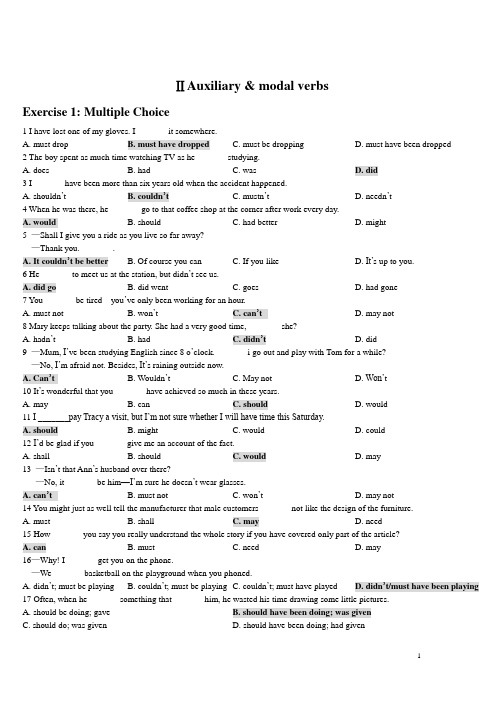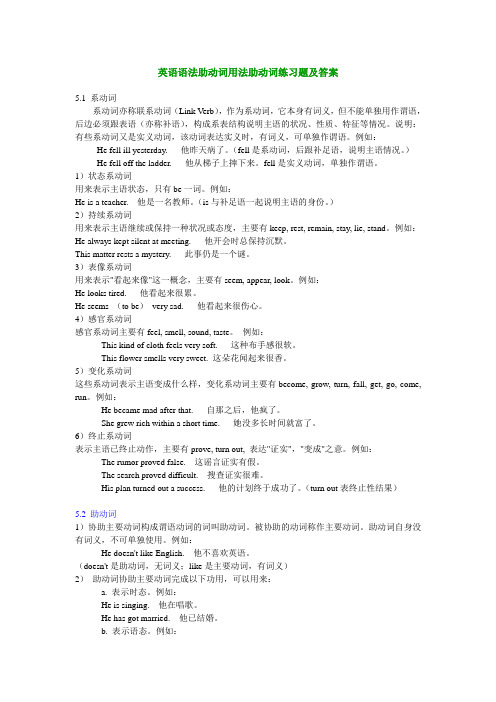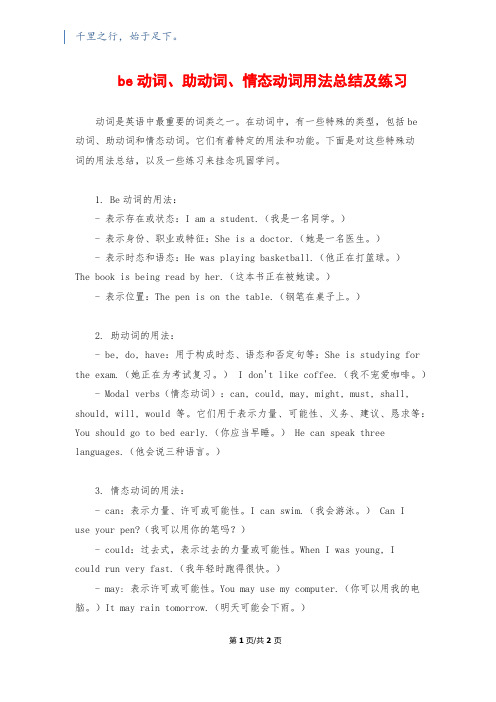英语语法-助动词和情态动词用法及习题
高考英语语法--助动词及情态动词

ⅡAuxiliary & modal verbsExercise 1: Multiple Choice1 I have lost one of my gloves. I _______it somewhere.A. must dropB. must have droppedC. must be droppingD. must have been dropped2 The boy spent as much time watching TV as he _______studying.A. doesB. hadC. wasD. did3 I _______have been more than six years old when the accident happened.A. shouldn’tB. couldn’tC. mustn’tD. needn’t4 When he was there, he _______go to that coffee shop at the corner after work every day.A. wouldB. shouldC. had betterD. might5 —Shall I give you a ride as you live so far away?—Thank you. _______.A. It couldn’t be betterB. Of course you canC. If you likeD. It’s up to you.6 He _______to meet us at the station, but didn’t see us.A. did goB. did wentC. goesD. had gone7 You _______be tired---you’ve only been working for an hour.A. must notB. won’tC. can’tD. may not8 Mary keeps talking about the party. She had a very good time, _______ she?A. hadn’tB. hadC. didn’tD. did9 —Mum, I’ve been studying English since 8 o’clock. _______i go out and play with Tom for a while?—No, I’m afraid not. Besides, It’s raining outside now.A. Can’tB. Wouldn’tC. May notD. Won’t10 It’s wonderful that you _______have achieved so much in these years.A. mayB. canC. shouldD. would11 I _______pay Tracy a visit, but I’m not sure whether I will have time this Saturday.A. shouldB. mightC. wouldD. could12 I’d be glad if you _______give me an account of the fact.A. shallB. shouldC. wouldD. may13 —Isn’t that Ann’s husband over there?—No, it _______be him—I’m sure he doesn’t wear glasses.A. can’tB. must notC. won’tD. may not14 You might just as well tell the manufacturer that male customers _______not like the design of the furniture.A. mustB. shallC. mayD. need15 How _______you say you really understand the whole story if you have covered only part of the article?A. canB. mustC. needD. may16—Why! I _______get you on the phone.—We _______basketball on the playground when you phoned.A. didn’t; must be playingB. couldn’t; must be playingC. couldn’t; must have playedD. didn’t/must have been playing17 Often, when he _______something that _______him, he wasted his time drawing some little pictures.A. should be doing; gaveB. should have been doing; was givenC. should do; was givenD. should have been doing; had given18 If I ever decided to quit, then nothing my parents or my coaches ___________say_________change my mind. It’s my life, not theirs.A. could; wouldB. could; shouldC. would; mustD. would; should19 Jenny _______with him at that time, for I was having dinner with her in my home.A. can’t have beenB. mustn’t have beenC. must have beenD. may have been20 —Who _______it be at this hour of a day?A. mayB. canC. mustD. should21 —Who told you the news?—I don’t remember clearly. It _______Mary.—It _______Mary. She doesn’t know it.A. may have been; can’t beB. can be; mustn’t beC. must have been; can’t have beenD. may have been; may not be22 He _______have completed his work, otherwise, he wouldn’t be enjoying himself by the seaside.A. shouldB. mustC. wouldn’tD. can’t23 Some aspects of a pilot’s job_______be boring, and pilots often _______work at inconvenient hours.A. can; have toB. may; canC. have to; mayD. ought to; must24 As you worked late yesterday, you _______have come this morning.A. needn’tB. mayn’tC. can’tD. mustn’t25 Research findings show we spend about two hours dreaming every night, no matter what we _______during the day.A. should have doneB. would have doneC. may have doneD. must have done26 Tom, you _______leave all your clothes on the floor like this.A. wouldn’tB. mustn’tC. needn’tD. may not27 My sister met him at the Grand Theatre yesterday afternoon, so he_______your lecture.A. couldn’t have attendedB. needn’t have attendedC. mustn’t have attendedD. shouldn’t have attended28 If I _______plan to do anything I wanted to, I’d like to go to travel as much as possible.A. wouldB. couldC. has toD. ought to29 —The woman biologist stayed in Africa studying wild animals for 13 years before she returned.—Oh, dear! She _______a lot of difficulties.A. may go throughB. might go throughC. ought to have gone throughD. must have gone through30 Mr. White _______at 8:30 for the meeting, but he didn’t show up.A. should have arrivedB. should arriveC. should have had arrivedD. should be arriving31 ----Do you know where David is? I couldn’t find him anywhere.----Well. He _____ have gone far---his coat’s still here.A. shouldn’tB. mustn’tC. can’tD. wouldn’t32 There was a lot of fun at yesterday’s party. You _____ come, but why didn’t you?A. must haveB. shouldC. need haveD. ought to have33 —I don’t mind telling you what I know.—You _______. I’m not asking for it.A. mustn’tB. may notC. cantD. needn’t34 Mary _______my letter; otherwise she would have replied before now.A. has receivedB. ought to have receivedC. couldn’t have receivedD. shouldn’t have received35 Carey didn’t go to the party last night because she _______the baby for her sister until 9:30.A. must have looked afterB. would have to look afterC. had to look afterD. should have looked after36 My pain _______ apparent the moment I walked into the room, for the first man I met asked sympathetically: “Are you feelingall right?”A. must beB. hadC. must have beenD. had to be37 As it turned out to be a small house party, we _______ so formally.A. needn’t dress upB. did not need have dressed upC. did not need dress upD. needn’t have dressed up38 The World Wide Web is sometimes jokingly called the World Wide Wait because it _____ be very slow.A. shouldB. mustC. willD. can39 Mary is very late, she _____.A. may miss her trainB. may have missed her trai nC. must miss her trainD. could miss her train40 —I’ll tell Mary about her new job tomorrow.—You _______her last week.A. ought to tellB. would have toldC. must tellD. should have told41 Some women _______a good salary in a job instead of staying home, but they decide not to work for the sake of the family.A. must makeB. should have madeC. would makeD. could have made42 You can’t imagine that a well-behaved gentleman _____ be so rude to a lady.A. mightB. needC. shouldD. would43 How _____ you say that you really understand the whole story if you have covered only part of the article?A. canB. mustC. needD. may44 I was on the highway when this car went past followed by a police car. They _____ at least 150 kilometers an hour.A. should have been doingB. must have been doingC. could have doneD. would have done45 The weather turned out to be fine yesterday. I _____ the trouble to carry my umbrella with me.A. should have takenB. could have takenC. needn’t have takenD. mustn’t have taken46 There __________ be any difficulty about passing the road test since you have practiced a lot in the driving school.A. mustn’tB. shan’tC. shouldn’tD. needn’t47 Tom, you _____leave all your clothes on the floor like this!A. wouldn’tB. mustn’tC. needn’tD. may not48 A left-luggage office is a place where bags ____ be left for a short time, especially at a railway station.A. shouldB. canC. mustD. will49 He paid for a seat, when he ______ have entered free.A. couldB. wouldC. mustD. need50 Has it been warned that all the children in this area ____ stay at their homes until the Bird Flu has been controlled?A. canB. willC. mayD. shallExercise 2: Error-Correction1 That small country at one time must be prosperous, for it enjoyed a high level of civilization.2 In a way I agree with you, but I think you could present your argument in a much better way.3 I regret having left the work unfinished I should plan everything ahead carefully4 A piece of evidence shows that life may exist on earth ago.5 I got up early but I didn't need to do so, because I had no work to do that morning.6 He knew that she mustn't have taken the book as she hadn't been in the house at that time.7 Tom has been knocked down by a car. He shouldn’t run across the street without looking around, you8 Judging by the noise that is coming from their room, I think that they must have a party.9 No statement was issued after yesterday’s talk, but it is thought that the two parties might be reaching an agreement.10 She mustn’t have been to Shanghai for business trip for I came across him in company half an hour ago. Exercise 3: Translate the following sentences into English1 电话正在响,但是没人接听。
高考语法-情态动词与助动词

高考语法——情态动词(can, may, must…)与助动词(be, do, have)一、“情态动词+动词完成式”用法1. may (might)+动词完成式:对过去行为的推测E.g. If we had taken the other road, we might have arrived earlier.2. can (could) +动词完成式:1) 表示对过去能做而未做的事,表示惋惜。
E.g. In those circumstances we could have done better.2) 对过去行为的推测E.g. Where can (could) she have gone?注意:can't和couldn't+动词原形:可以表示否定推断。
E.g. He can't be the President.3. must +动词完成式: 对过去行为的推断,具有极大可能性,意为“一定”E.g. He must have undergone an ordeal no one can imagined.注意:“must + 动词原形”表示对现在行为的推测;“must be +现在分词”表示对现在正在进行的或未来的推测。
E.g. She looks happy; she must be having a good time.It must be raining tomorrow according to the weather forecast.4. “needn't + 动词完成式”和“didn't need to do”1) “needn't + 动词完成式”表示一种已经做过的但无必要的行为E.g. You needn't have watered the flowers, for it is going to rain.2) "didn't need to do" 表示没有必要做,实际上也没有做的行为E.g. I didn't need to mop the floor. My mom did it.5. "Should + 动词完成式":肯定结构表示应该做的事而没有做,否定式表示某行为不该发生却发生了。
情态动词和助动词的用法详解及练习

助动词的用法总结及讲解一.助动词:情态助动词,基础助动词助动词的定义:助动词和情态动词都是英语中特殊动词,即:不能再句子中独立充当句子成分。
而是与实义动词一起使用构成复合用语。
常配合主要动词,协助构成否定句,疑问句,强调句,时态,语态等语法形式。
基础助动词有:be, do情态助动词基本用法总结:二.助动词的功能助动词协助主要动词完成以下功用,可以用来:a. 表示时态,例如:What are you reading?(你正在阅读什么?)I am reading a magazine.(我正在阅读杂志。
)He is singing. 他在唱歌。
We are working hard in the garden.(构成现在进行时)b. 构成疑问句,例如:Do you like college life? 你喜欢大学生活吗?Do you live in Shanghai?c. 与否定副词not合用,构成否定句,例如:I don't like him. 我不喜欢他。
助动词练习一. +句子剩余部分。
1.2.She is a lovely girl. ________________________________________3.We are classmates. ______________________________________4.I am a doctor. ________________________________________5.There is a bird in the tree. ________________________________6.They are good friends. ____________________________________7.I love my parents. _______________________________________9. We have a pleasant home. _______________________________10.They go to church on Sunday. _____________________________11.You are a singer. ______________________________二. 用do does be 填空1. _____ she know all the answers ?Yes , she ____ . No, she _____.2. _____ the twins often fight ?Yes ,_____ do. No, _____ don’t.3. _____ your dad like listening to music?Yes ,____ does . No, _____ doesn’t.4. _____ you have a new teacher?Yes , I ______. No, I ______.5. _____ she a teacher?Yes, she _____ . No, she _____.6. _____ your father smoking in the living room?Yes, ____ is .No, he _____.情态助动词练习二.选择1.()-Dad, may I watch TV?-No, you can’t. You _______ finish your homework first.A. mustB. canC. may2.( ) —Must I be home before eight o'clock, Mum?— No, you_____. But you have to come back before ten o'clock.A. needn'tB. can'tC. mustn't3.( ) —_________ I borrow your history book?—Sure. Here you are.A. MustB. MayC. NeedD. Will4.() you like some bread ?A . Would B. Could C . Can5.()We throw the waste in the zoo.A. can’tB. don'tC. mustn’t6. ( ) We should more flowers, and we shoul dn’t cut any flowers.A. plantB. plantingC. plants7. ( ) May I have some water?A. Yes,you have.B. Yes,you can.C. Yes,certainly.8. ( ) Shall we work on the farm ?A. Yes, we do.B. Yes, we shall. B. All right.9. ( ) Would you have something to announce?A. Yes, we would.B. Yes, I’d like .C.Yes, of course.10. ( ) Can I help you?A.Yes, you can.B.No, I can do it.C.Yes. I’d like some oranges. 三.填空1. Must I stand up? No, you ________.2. ________ I speak something? Yes, you ________.3. ________ I leave the park now? No, you _________ stay here.4. My grandmother is ill. I _________ stay at home and look after her.5. ________ you like some juice?6. They ________ take more exercise.7. ________ you tell me the way to the museum?8. The watch ________ tell us the right time.9. ________ you like to go boating with us?10. ________ we play chess next weekend?四.按要求改写句子。
英语语法助动词用法助动词练习题及答案

英语语法助动词用法助动词练习题及答案5.1 系动词系动词亦称联系动词(Link Verb),作为系动词,它本身有词义,但不能单独用作谓语,后边必须跟表语(亦称补语),构成系表结构说明主语的状况、性质、特征等情况。
说明:有些系动词又是实义动词,该动词表达实义时,有词义,可单独作谓语。
例如:He fell ill yesterday.他昨天病了。
(fell是系动词,后跟补足语,说明主语情况。
)He fell off the ladder.他从梯子上摔下来。
fell是实义动词,单独作谓语。
1)状态系动词用来表示主语状态,只有be一词。
例如:He is a teacher.他是一名教师。
(is与补足语一起说明主语的身份。
)2)持续系动词用来表示主语继续或保持一种状况或态度,主要有keep, rest, remain, stay, lie, stand。
例如:He always kept silent at meeting.他开会时总保持沉默。
This matter rests a mystery.此事仍是一个谜。
3)表像系动词用来表示"看起来像"这一概念,主要有seem, appear, look。
例如:He looks tired.他看起来很累。
He seems (to be)very sad.他看起来很伤心。
4)感官系动词感官系动词主要有feel, smell, sound, taste。
例如:This kind of cloth feels very soft.这种布手感很软。
This flower smells very sweet. 这朵花闻起来很香。
5)变化系动词这些系动词表示主语变成什么样,变化系动词主要有become, grow, turn, fall, get, go, come, run。
例如:He became mad after that.自那之后,他疯了。
She grew rich within a short time.她没多长时间就富了。
be动词、助动词、情态动词用法总结及练习

千里之行,始于足下。
be动词、助动词、情态动词用法总结及练习动词是英语中最重要的词类之一。
在动词中,有一些特殊的类型,包括be动词、助动词和情态动词。
它们有着特定的用法和功能。
下面是对这些特殊动词的用法总结,以及一些练习来挂念巩固学问。
1. Be动词的用法:- 表示存在或状态:I am a student.(我是一名同学。
)- 表示身份、职业或特征:She is a doctor.(她是一名医生。
)- 表示时态和语态:He was playing basketball.(他正在打篮球。
)The book is being read by her.(这本书正在被她读。
)- 表示位置:The pen is on the table.(钢笔在桌子上。
)2. 助动词的用法:- be, do, have:用于构成时态、语态和否定句等:She is studying for the exam.(她正在为考试复习。
) I don't like coffee.(我不宠爱咖啡。
)- Modal verbs(情态动词):can, could, may, might, must, shall, should, will, would等。
它们用于表示力量、可能性、义务、建议、恳求等:You should go to bed early.(你应当早睡。
) He can speak three languages.(他会说三种语言。
)3. 情态动词的用法:- can:表示力量、许可或可能性。
I can swim.(我会游泳。
) Can Iuse your pen?(我可以用你的笔吗?)- could:过去式,表示过去的力量或可能性。
When I was young, Icould run very fast.(我年轻时跑得很快。
)- may: 表示许可或可能性。
You may use my computer.(你可以用我的电脑。
2020-2021学年人教版初中英语语法——第10章助动词和情态动词

Do you like college life?你喜欢大学生活吗?(构成疑定句)He is studying English.他正在学英语。
(表示时态)A building was built beside the school.学校旁边建了一座大楼。
(表示语态)Do come to the party tomorrow evening.明天晚上一定要来参加聚会。
(加强语气)英语中的助动词主要有:do,does,did;be;have,has,had,will,would,shall,should等。
1.助动词 do,does,did的7种用法(1)do,does,did用来构成一般疑问句do,does用于一般现在时态,did用于一般过去时态;do用于主语为非第三人称单数形式的句子中,does只用于主语是第三人称单数的句子中。
如:Do you want to have a try?你想要试一试吗?Does she have any good idea?她有好主意吗?Did you study German?你们学德语了吗?(2)do,does,did+not 构成否定句do,does用于一般现在时态,did用于一般过去时态;do用于主语为非第三人称单数形式的句子中,does只用于主语是第三人称单数的句子中。
如:I do not want to go there now.我现在不想去那里。
He doesn't like playing the guitar.他不喜欢弹吉他。
In the past,many students did not know the importance of English.过去,许多学生不知道英语的重要性。
注意:①do not可以缩写为don't;does not可缩写为doesn't;did not可缩写为didn't。
②助动词do,does,did后要用动词原形。
2023年中考英语语法---动词及动词短语专题复习及练习题(含答案)

2023年中考英语语法---动词及动词短语专题复习及练习题(含答案)一、动词的基本框架动词包括实义动词、系动词、助动词和情态动词。
(一)实义动词实义动词是能独立作谓语的动词。
按其句法功能可分为及物动词和不及物动词;按其持续性可分为延续性动词和非延续性动词。
1.及物动词:及物动词本身意义不完整,需要接宾语才能使其意思完整。
(1)动词+宾语I like this book very much.我非常喜欢这本书。
(2)动词+宾语+宾补We call the bird Polly.我们叫这只鸟Polly。
I saw the children play in the park yesterday.昨天我看见孩子们在公园玩。
注意:用省略to的不定式或现在分词作宾补的动词有:have,see,watch,notice,hear等。
(3)动词+间接宾语+直接宾语Please pass me the salt.请把盐递给我。
常见的带双宾语的动词有:give,bring,buy,get,leave,lend,make,offer,pass,teach,tell等。
2.不及物动词不及物动词自身意思完整,不用接宾语。
Horses run fast.马跑得快。
(1)有些动词既可作及物动词又可作不及物动词。
We study English.我们学习英语。
(及物动词)We study hard.我们努力学习。
(不及物动词)(2)有些不及物动词与一些别的词搭配在一起构成动词短语,它的作用相当于一个及物动词。
①动词+介词Listen to the teacher carefully.仔细听老师讲。
此类动词短语后面的宾语无论是名词还是代词,都只能放在介词后面,不能放在动词和介词之间。
②动词+副词+介词Let’s go on with our work!让我们继续我们的工作吧!He gets along well with his classmates.他与他的同学们相处得很好。
be动词、助动词、情态动词用法总结及练习(答案)

助动词do/does
什么是助动词?
顾名思义,助动词就是帮助动词的,而本身没有 实际意义的动词,是具有雷锋精神的词汇。
助动词do的三种变化形式
do 第三人称单数时使用的does 过去式did
do的基本用法:
1 构成否定句 2 构成一般疑问句及回答 3 构成特殊疑问句
do的各种形式
肯定式:do 否定式:don't/do not do用在第一人称单复数、第二人称单复数和第三人称复 数作主语,且时态为一般现在时的句子,如:
4. shall的用法
1)shall常用于第一人称,表示简单的将来,构成将来时态。(助词)
ex: I shall think it over and let you know my idea.
When shall we meet again?
We shall have a good time in the park. 2) shall用于第一人称,还可以表示征求对方的意愿。
ex: My brother is ill, so I have to call the doctor in the middle of the night. 2) have to有人称、时态和单复数上的变化,而must只有一种形式。
have to → had to I have to/she has to
shall和will的对比
1)shall和will作为助动词可以与动词原形一起构成将来时。如: I shall study harder at English. 我将更加努力学习英语。 He will go to Shanghai. 他要去上海。
2)以前的语法中,shall用于第一人称,will只用于第二、第三人称。现在,尤其 是在口语中,will常用于第一人称,但shall只用于第一人称,如果用于第二、第三 人称,就不再有“将要”的意义,就变成命令、警告或威胁的意思了。
- 1、下载文档前请自行甄别文档内容的完整性,平台不提供额外的编辑、内容补充、找答案等附加服务。
- 2、"仅部分预览"的文档,不可在线预览部分如存在完整性等问题,可反馈申请退款(可完整预览的文档不适用该条件!)。
- 3、如文档侵犯您的权益,请联系客服反馈,我们会尽快为您处理(人工客服工作时间:9:00-18:30)。
目录1助动词和情态动词的定义 (2)2 can,may,must (3)3 Will you~?和Shall I(we)~? (10)4 would和should (14)5 have to (16)练习题 (17)答案 (18)1助动词和情态动词的定义在英语中,助动词一般没有词义,主要帮助构成谓语,表示时态、语态或构成疑问及否定形式。
对于助动词,同学们一般了解即可。
情态动词与助动词不同,它有词义,但它也和助动词一样,不能单独作谓语,它必须和其他动词一起构成谓语,另外重要的一点是情态动词没有人称和数的变化;情态动词后必须跟动词原形。
(×)She cans swim well. (×)She can swims well.(○)She can swim well. (○)She swims well.即使主语是第三人称单数(例如she)can也不能加“s”。
句子中有情态动词can时,即使主语是第三人称单数,也不能在一般动词(例如swim)上加“s”。
1 助动词的种类1.be(am,are,is,was,were,been,being)它与现在分词结合,可以构成进行时态(参见第九章),与过去分词结合可以构成被动语态(参见第十三章)。
I am reading the book.我正在读这本书。
The book was written by me.这本书是我写的。
2. have(has,had,having)它与过去分词结合,构成完成时态(参见第十一章)。
I have finished my homework.我已经写完作业了。
3.shall(should),will(would)它与动词结合构成将来时(参见第十章)。
I will visit Beijing tomorrow.我明天将到北京参观。
4. do(does,did)它与其他动词结合构成否定句和疑问句(参见第六、七、八、十九章)。
I don't like dog.我不喜欢狗。
Do you clean the room.你打扫房间吗?2情态动词的种类2 can,may,must对初学者而言,can,may,must是三个最重要的情态动词,其基本句型如下:肯定句:主语+can,may,must +动词原形.否定句:主语+can,may,must +not +动词原形~.疑问句:Can,May,Must +主语+动词原形~?1 can,may,must的肯定句You may eat lunch,but you must wash your hands.你可以吃饭,但是你必须洗手。
1.cana.表示能力;能,会She can run fast,but I can't.她很会跑,但是我不会。
(表能力,此时may,must都不可替代)b.表示可能;能够I can get there in ten minutes.我十分钟之后就可以到那儿。
(表示一种可能性)c.表示允许;许可(不如may正式,常用于口语)You can use this dictionary.你可以用这本字典。
(此时还可以用may代替can,但一般会话中用can)比较can和be able tocan只有现在式和过去式,而be able to可以用于各种时态。
can(could)表示能力时,可用be able to代替。
I can(=am able to)pay for the book. 我买得起那本书。
He will be able to tell you the news soon. 他很快就能告诉你消息了。
She has been able to come to school. 她已经能去学校了。
2.maya.表示请求、许可(比can正式)May I borrow your pen?我可以借你的钢笔用一用吗?b.可能、或许(谈论可能性、表示推测,一般用于肯定句)Tomorrow I may go shopping.明天,我可能(或许)去商店买东西。
He might be our new teacher.他或许是我们的新老师。
注意might在表示推测时,不表示时态,只是说明可能性比may还要小。
3.musta.必须、应该(表示有做某一动作的必要或义务)You must buy a ticket.你必须买一张票。
b.一定、准是(表示有把握的判断或推测,一般只用于肯定句中)在You must~.这一句型中,它的意思与祈使句相同。
You must get up early. =Get up early.你必须早起。
You must study hard. =Study hard.你必须用功读书。
He must be our new teacher.他肯定是我们的新老师。
(语气比may,might要肯定得多)比较must与have tomust侧重于个人意志和主观上的必要,have to侧重于客观上的必要。
如果用于过去时态或将来时态时,则要用have to来代替。
但must可用于间接引语中表示过去的必要或义务。
My brother was very ill,so I had to call the doctor in the middle of the night.我弟弟病得很厉害,我只得半夜里把医生请来。
(一般过去时)I haven't got any money with me,so I'll have to borrow some from my friend.我身上没有钱,只好向朋友借点了。
(一般将来时)He said that they must work hard.他说他们必须努力工作。
2.can,may,must的否定句I can not write a letter in English.我不会用英语写信。
You must not eat so much.你一定不能吃太多。
含有情态动词can,may,must的句子,只要在它们后面加上not,就变成了否定句。
1.can的否定句can的否定式是can not,普通的写成cannot,缩字为can't,读作[E%:QC]。
She can't play basketball.她不会打篮球。
I couldn't swim until I was ten.我直到十岁才会游泳(十岁以前我不会游泳)。
It can't be true.那不可能是真的。
2. may(might)的否定句注意can表示怀疑或不肯定时,用于否定句和疑问句或感叹句中。
could有时只表示怀疑、推测程度,不表示时态。
He couldn't be a badman.他不大可能是坏人。
He can't be a badman.他不可能是坏人。
may not也表示“不可以”的意思,但单独使用时不多,大多使用于回答疑问句时。
May I come in?我可以进来吗?No, you can(may) not.(=No, you mustn't).不,你不可以进来。
3.must的否定句must的否定式是must not,缩写为mustn't,读作[>P)KQC]。
译为“不可以”、“一定不……”。
You mustn't leave so early.你们不要走得太早。
They mustn't take any book out of the room.他们不可以从房间里拿走书。
注意You must not……这一句型和否定的祈使句的意思一致。
You mustn't open this box.你不可以打开这个盒子。
=Don't open this box.请勿打开此盒。
3 can,may,must的疑问句(把can,may,must放在句首,句子就成为疑问句了)Can Li Ming speak English?李明会说英语吗?May I close the door?我可以把门关上吗?Must I read this book now?我现在一定要读这本书吗?1. can的疑问句Can you play the piano?你会弹钢琴吗?Yes,I can.是的,我会。
No,I can't.不,我不会。
Can it be true?它可能是真的吗?Could he be a bad man?他可能是坏人吗?注意can表示怀疑、推测时,只用于否定句及疑问句中。
(参见第154页<1.can的否定句>的注意)。
左文例句中的could不表示时态,只表示怀疑、推测的程度。
2.may的疑问句May I take this seat?我可以坐这个座位吗?Yes,you may./Sure.可以。
No,yon may not.不可以。
必背!May…?的回答还可以有下列方式:Yes,of course.是的,当然可以了。
Yes,certainly.当然可以了。
Sure.当然。
No,you must not 不,不行。
(具有强烈禁止的意思)No,you can't 不,不行。
(口语上大多采用这一句型)3. must的疑问句Must I live here?我必须住在这里吗?Yes,you must.是的,你必须。
No,you needn't = No,you don't have to.不,不必了。
表示推测的用法can , could ,may ,might ,must 皆可用来表示推测,其用法如下:a.could ,might 表示推测时不表示时态,其推测的程度不如can ,may。
b.can ,could 用于否定句和疑问句中。
句型:主语+ can't , couldn't +be +动词 -ing~.(否定句)Can ,Could +主语 +be +动词 -ing~.(疑问句)They can't be cleaning the room now.他们现在不可能在打扫房间。
c.may ,might , must 用在肯定句中。
句型:主语+ may ,might ,must +be +动词 -ing(表示对现在发生动作的推测)He must be sleeping . 他现在肯定在睡觉。
d.但如果上述这些词(must ,can't… ) + have +过去分词则指对过去已发生的事进行推测。
The road is wet , It must have rained last night .地是湿的;昨天晚上肯定下雨了。
